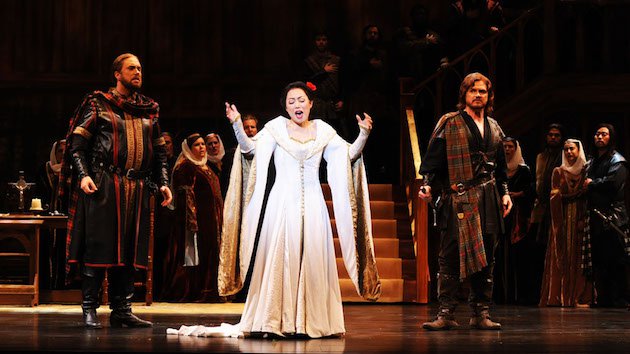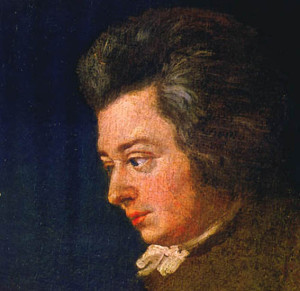Putting the “bel” in “bel canto”: last call for a stunning “Lucia di Lammermoor” at Opera San José!
Saturday, September 24th, 2016
Tenor Kirk Dougherty and soprano Sylvia Lee cuddle in “Lucia di Lammermoor.”
Who was the first novelist to enjoy truly international fame? If you guessed Charles Dickens, you would be wrong. His success was preceded by the author who is little read today, Sir Walter Scott. The Scottish author is certainly remembered in the world of opera, with his story The Bride of Lammermoor, a far-fetched tale of mayhem, madness, and bloodshed that is nevertheless based on a true story, told by Scott’s mother, Anne Rutherford, about an ill-fated romance set within a larger feud between the Dalrymples and the Rutherfords.

He told the story.
However, it’s not the plot that draws us into Gaetano Donizetti‘s 1835 Lucia di Lammermoor, a gory little tale of tribal vengeance in the highlands, but the glorious music, from beginning to end. How sad for my readers, then, that I’ve taken so long to write about this wonder of a production at Opera San José – since it closes tomorrow, with a Sunday, September 5, matinee at 3 p.m.! My excuse: I only saw the opera myself Friday night.
Soprano Sylvia Lee‘s perfect coloratura performance in the title role is a big reason for the excitement. Lucia has become her signature role, performed in Hong Kong, Tel Aviv, and her native South Korea before she began her residency at Opera San José this season. General Director Larry Hancock, in a talk before the performance, compared her to late, legendary Lily Pons, who was also associated with the role.

He set it to music.
Charlise Tiee, writing in San Francisco Classical Voice, “Her acting was completely engrossing, her sweetness which is crushed into derangement, was utterly convincing. … Her voice is resonant from top to bottom and without a hard edge or a hint of shrillness. She attacked the coloratura passages with clarity and ease, yet was expressive. Her voice alone is well worth the trip to the South Bay and what a pleasure it is to see such an impeccable performance of an iconic role.”
“The show breathes with wonderful musicality, simple and direct acting, and plenty of vocal fireworks that underline the ‘bel’ in bel canto.”
Elijah Ho, writing in the San Jose Mercury was also enthusiastic: “To put it bluntly, it was a thing well-conceived and brilliantly executed. … Get in your car, or take the bus or the train. There is magnificent vocalism and so much more.”
By the time she had sung her final notes as Lucia on Saturday evening, it was apparent soprano Sylvia Lee had left us with something special.

A matchless Lucia
The singing actor, a winner of the 2007 Metropolitan Opera National Council Auditions, conveyed meaning seamlessly throughout the evening. We marveled at how she handled the delicate cantilena of “Regnava nel silenzio”, the way she took the delicate roulades in “Quando, rapito in estasi” with ease and elegance. When she was in her element, there was incredible evenness of tone. Pitches, no matter the distance, were hit squarely in the middle, and her legato flowed the Mozart-prescribed way: “like oil.”
Lucia’s mental collapse, culminating in the much-anticipated mad scene, was both subtle and gradual. Lee’s facial expressions, beginning with wide, crazy eyes, evolved from “Il pallor funesto” to “Soffriva nel pianto.” By the end, I couldn’t help but be disturbed by the contrast between her blood-soaked white dress, the forlorn, exhausted expressions of her face and the emanating beauty of her coloratura in response to the flute.
The opera is set in the 17th century, but Larry Hancock, thinking of the enormous plumed hats of the era and the silly breeches with their “nests of ribbons” (I loved that phrase), vowed “not on my stage.” He preferred a more medieval look to the opera, and recast Lucia in the 15th century. This required him to adjust political woes that beset the characters, suggested in the single line in the original: “William is dead; we will see Mary mount the throne” – referring to the joint rule of Mary, daughter of James II, and her husband William of Orange. Never happened, of course – Mary died first. Hancock rewrote the line, setting the action after the Battle of Bosworth Field in 1485, when Henry Tudor (i.e., Henry VII) defeated Richard III. Since England and Scotland were not united until 1707, during the reign of Queen Anne, Mary’s sister, I couldn’t understand why the Scots would much concerned with either death.
No matter, the 15th-century costumes were sumptuous, recalling the rough land where the elegant French Mary Stuart‘s life would be tormented by feudal clashes and turf battles less than a century later.

Baritone Matthew Hanscom puts the pressure on Lee and Dougherty in “Lucia di Lammermoor.”





